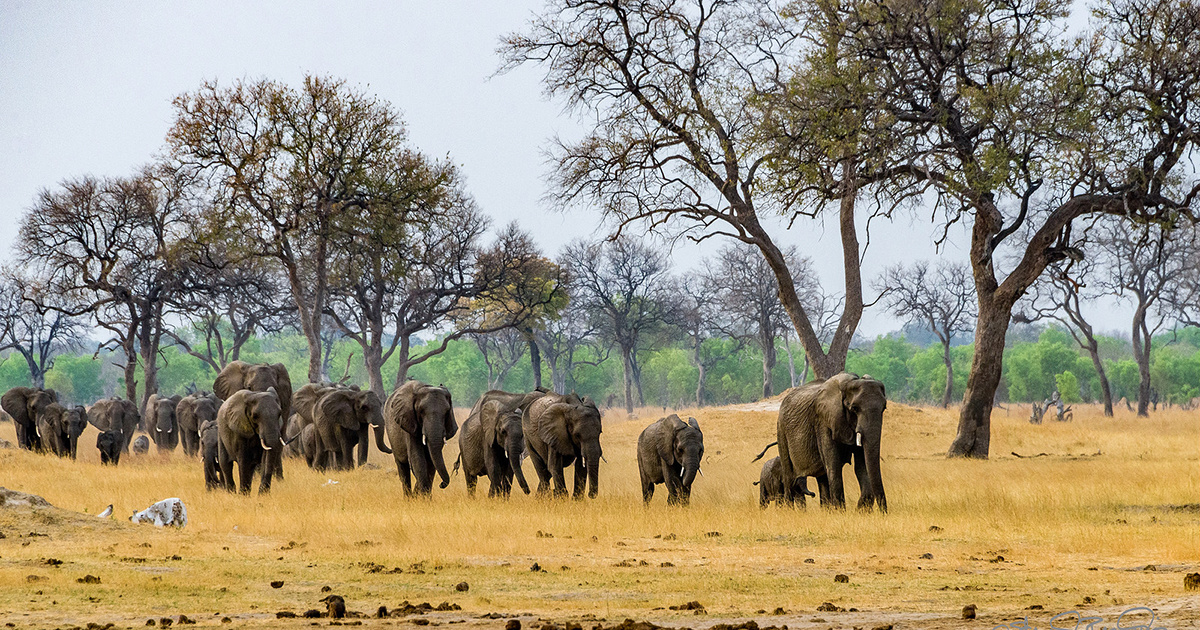

Hwange National Park, Zimbabwe. Steven dosRemedios / Flickr / CC BY-ND 2.0
If you follow environmental news, every day it seems like the
world is getting worse. One landmark study found that animals are going extinct 1,000 times faster than their natural rate because of human influence and habitat loss.
To help fight back against these worrying trends, Swiss billionaire and conservationist Hansjörg Wyss will be donating $1 billion over the next 10 years through his
Wyss Foundation.
In a
New York Times op-ed published Wednesday, Wyss wrote that the natural world is best conserved as public national parks, wildlife refuges and marine reserves, “forever open for everyone to experience and explore.”
"For the sake of all living things, let’s see to it that far more of our planet is protected by the people, for the people and for all time.” –Hansjörg Wyss#CampaignForNaturehttps://t.co/G2U1bYlPtQ
— Wyss Campaign for Nature (@WyssCampaign) October 31, 2018
Scientists have concluded that at least 50 percent of the planet needs to be protected in order to save a large majority of plant and wildlife species from extinction. However, as Wyss noted, only 15 percent of the planet’s lands and 7 percent of the oceans have been protected in a natural state.
“Every one of us—citizens, philanthropists, business and government leaders—should be troubled by the enormous gap between how little of our natural world is currently protected and how much should be protected,” he wrote. “It is a gap that we must urgently narrow, before our human footprint consumes the Earth’s remaining wild places.
Wyss said the $1 billion will go toward a United Nations goal of protecting 30 percent of the planet by 2030.
To achieve this goal, Wyss has partnered with the
National Geographic Society, the Nature Conservancy and Argentine conservation group Fundacion Flora y Fauna to launch the Wyss Campaign for Nature.
Protecting nature at scale (before it’s too late) requires smart strategies, bold philanthropy & big thinking—@WyssCampaign provides this and more. I hugely admire Hansjörg Wyss's leadership & generosity. @nature_org is thrilled to be on the team! My blog: https://t.co/UWVJX1AtGS
— Mark Tercek (@MarkTercek) November 1, 2018
The campaign focuses on four primary strategies: supporting locally led conservation projects; encouraging the international conservation targets; raising public awareness of the conservation crisis; and investing in science, according to a
press release of the initiative.
“The Nature Conservancy is proud to be among other great organizations receiving funding for the first round of on-the-ground projects that the Wyss Campaign for Nature is supporting,” Mark Tercek, the CEO of the Nature Conservancy,
wrote. “All together, these projects will help protect around 10 million acres of land and 17,000 square kilometers of ocean areas across thirteen countries.”
The Nature Conservancy will use the $6.9 million in funding from the Wyss Campaign for Nature to expand its “Blue Bonds” conservation finance tool in the
Caribbean, and will work with local partners to create a more than 200,000-acre sustainable agriculture zone and protected area in Australia’s Murray-Darling Basin.
For its part, the National Geographic Society will document why ambitious global conservation action is needed to help alleviate the worst impacts of climate change and address the problems associated with the declining health of the natural world, according to the press release.
“We are proud to join forces with the Wyss Foundation on this bold effort to accelerate the protection of Earth’s lands, waters, and wildlife,” Tracy R. Wolstencroft, president and CEO of the National Geographic Society, stated.
Since 1998, the Wyss Foundation has donated more than $450 million for environmental initiatives in the United States, Africa, South America, Europe, Canada and Mexico, helping conserve nearly 40 million acres of land and water.
Wyss, who founded the medical device company Synthes and is now based in Wyoming, is among the set of wealthy individuals who signed
The Giving Pledge, in which he committed to give away at least half his wealth to charitable causes.
“From the forests that supply our drinking water to the rugged backcountry that inspires the imagination of our children, everyone on Earth has a stake in conserving our planet’s wild places before they are gone,” Wyss stated. “I believe that to confront the global conservation crisis, we need to do far more to support locally-led initiatives that conserve lands in the public trust, so that everyone has a chance to experience and explore the wonders of the outdoors.”
This week began with the disturbing news that human activity has caused a 60 percent decline in wildlife since 1970.@DebbieatEMA @CenterForBioDiv @EndangeredOcean @LoriAnnBurd
https://t.co/j6lPmq3fgA— EcoWatch (@EcoWatch) November 2, 2018

 233k
233k  41k
41k  Subscribe
Subscribe 